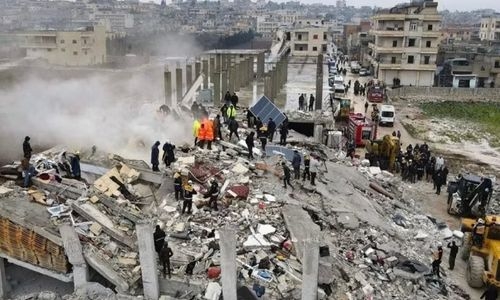Earthquakes in Turkey moved the country by 5-6 metres, says expert
Agencies | Ankara
The Daily Tribune – www.newsofbahrain.com
The catastrophic 7.8 magnitude earthquake that hit Turkey, resulting in the death of over 17,000 people, could have massively shifted the entire nation.
The earthquake, which was felt as far away as Greece, has prompted concerns from geologists who believe that the country may have shifted three meters to the south-west.
Carlo Doglioni, the head of Italy's National Institute of Geophysics and Volcanology, stated that the quake appeared to have moved Turkey to the south-west and Arabia to the north-east.
“It is as if Turkey had moved to the south-west and Arabia to the north-east.
What we call the Arabian plate has moved about three metres in a northeast-southwest direction relative to the Anatolian plate,” Carlo Doglioni was quoted as saying by media outlet Italy24.
The devastating earthquake highlights Turkey's vulnerability to seismic activity, as the country is located above major fault lines that border the Anatolian Plate, Arabian Plate, and Eurasian Plate.
Although more information is needed to draw a definitive conclusion, the quake has led to widespread destruction and has left the affected areas grappling with the aftermath.
Turkey (Turkiye) and Syria, which are located on the Anatolian tectonic plate, saw one of the highest death counts after three earthquakes and over 80 aftershocks hit the region within 18 hours.
The Anatolian plate is prone to earthquakes as the Eurasian and African tectonic plates exert pressure on it from the north and south while the minor Arabian plate presses from the east.
Tectonic plates are massive pieces of the Earth's crust, the uppermost layer of the planet. Most earthquakes are caused by the movement of these plates.
On Monday, the Arabian plate moving northwards and grinding against the Anatolian plate created extreme pressure, resulting in the massive earthquakes.
The earthquake has also taken a toll on rescue workers, particularly the White Helmets who have been operating in Syria for 11 years.
Hamid Qatini, a veteran White Helmets rescuer, stated that the earthquake's destruction has been more difficult to deal with compared to air strikes, as the damage is much greater and the feeling of helplessness is much stronger.
He added that every time they rescue someone, they feel a sense of joy, but they have also witnessed very tragic scenes that will undoubtedly affect them later.
As aid continues to pour into Turkey, the UN has temporarily suspended aid into north-western Syria that flows from Turkey due to the damage caused to the roads by the quake.
Despite the temporary suspension of aid, the first batch of aid from Egypt and the UAE has arrived at Damascus airport.
The earthquake has prompted a massive international effort to help the affected populations, but it remains to be seen how long it will take for the affected areas to recover from the disaster.
Related Posts

